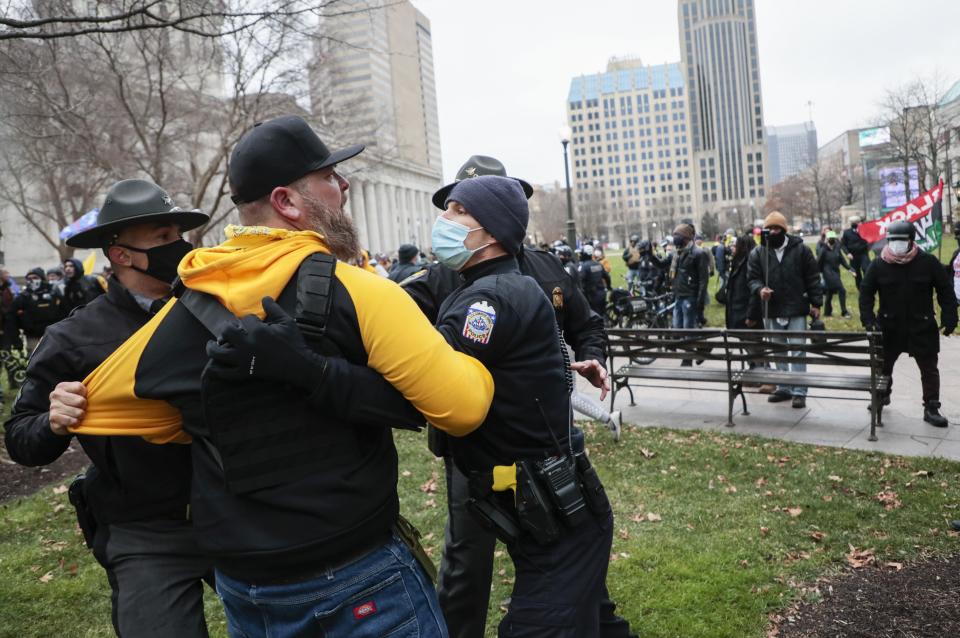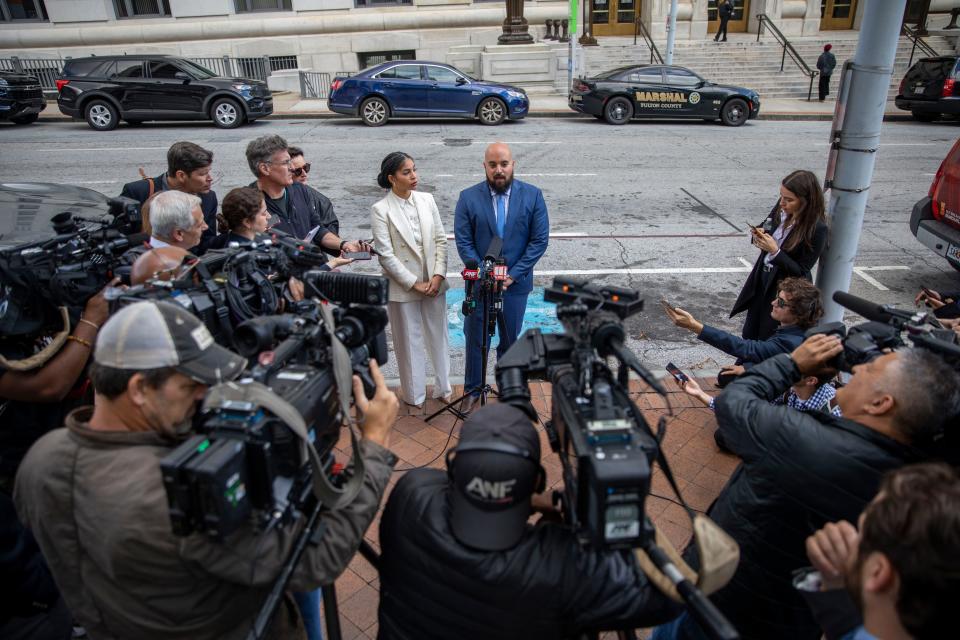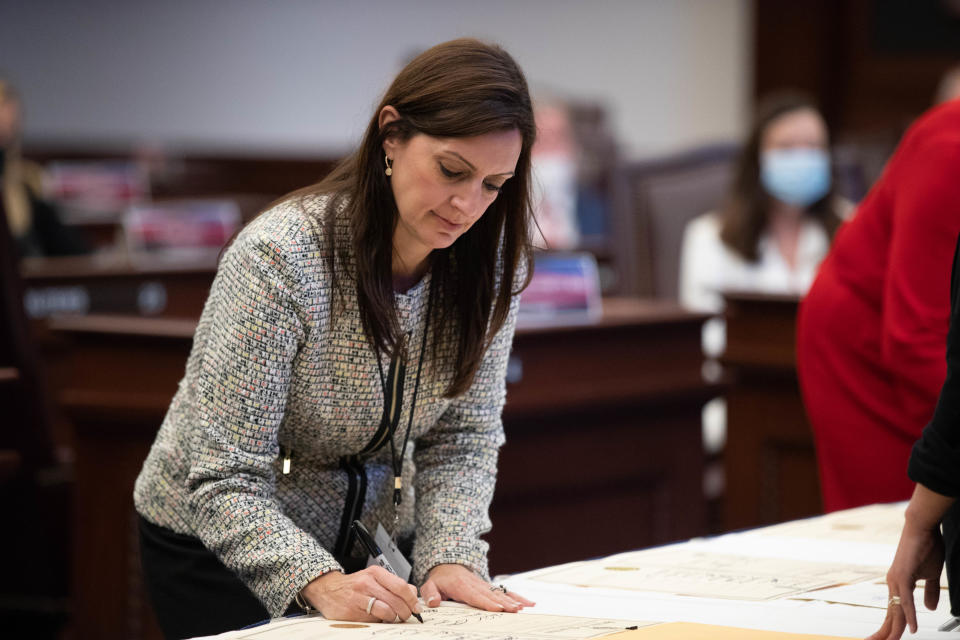'Terrifying': Democrats say they have plans to keep electors safe from political violence
When it came time to cast his ceremonial Electoral College vote for Joe Biden in 2020, Democrat Khary Penebaker had to keep things hush-hush.
He wanted to bring his girlfriend at the time but wasn't allowed a guest. He couldn't even walk through the front door of Wisconsin's statehouse.
Instead, Penebaker and other Badger State electors met at an undisclosed location. Law enforcement escorted the group through tunnels to arrive at a room in the statehouse, which had been closed to the public.
The 46-year-old Democrat, who ran unsuccessfully for Congress in 2016, called the experience "terrifying." He was scared after seeing stories of election workers being harassed in other swing states.
Penebaker, who is Black, said he thought back to how civil rights activists more than half a century ago had crossed Alabama's Edmund Pettus Bridge knowing they would be beaten by police officers on the other side. He said if they could survive that, he could muster the courage to cast an electoral vote.

Democrats, scholars and election watchdogs are keenly vigilant about the safety of people like Pennebaker, who sign up to cast votes for their political parties on behalf of the Electoral College a month after Election Day, and who typically assemble at statehouses as a key part of the Constitutionally mandated ceremonial process of choosing the next president.
Political violence can slow down the process of electing the president because officials end up needing to evacuate buildings and halt proceedings to shore up security, such as what happened on Jan. 6, 2021. The additional time can give bad actors time to sow doubt in the democratic process.
Democrats did not disclose the specifics of their security plans, but a top official with the Democratic National Committee said they had one in 2020 and have one for 2024. When electors are placed, which is happening all over the country, the party will hold a security briefing for them.
The concerns about electors' safety are similar to the ones about election workers, which a new survey released this month by the Brennan Center for Justice shows 38% of whom have experienced threats, harassment, or abuse for doing their jobs, forcing many to quit.
Secretaries of state have said it’s getting harder to recruit and retain poll workers, and Democrats say people are less willing to sign their names to be electors. Even when they do, they experience anxiety.
USA TODAY spoke with five Democratic Party officials in four swing states – Georgia, Michigan, Minnesota, and Nevada – who all said electors are feeling apprehensive. The Republican National Committee and presumptive 2024 GOP nominee Donald Trump's campaign did not respond to requests for comment about security concerns. Efforts to reach Republican officials in Pennsylvania were unsuccessful.
This chorus is likely to intensify in the coming months, especially given Trump's refusals to explicitly rule out political violence in multiple interviews should the former president lose this fall and his previous attempt to fraudulently replace those slates in 2020 to overturn his election loss.
Tolulope Kevin Olasanoye, executive director of the Georgia Democratic Party, pointed to the Jan. 6, 2021, attack on the U.S. Capitol – which pressured then-Vice President Mike Pence to reject the legitimate electoral votes from people like Penebaker so that Trump could win the election – as an example of what could happen.
"We’d be foolish not to take the security of electors and everyone involved in our presidential electoral process very seriously – for good reason," he said.
Security concerns based on 'credible threats' in 2020

Penebaker said he received hundreds of emails threatening him with lynching if he didn’t change his 2020 electoral vote from Biden to Trump.
He had panic attacks, fearing something could happen at any minute. He said he'll never sign up to be an elector again.
"They took what should be the pageantry, the majestic feel of being an elector," Penebaker said. "You’re one of (538) people in the country who get to do this, and that’s a huge honor, and to have it robbed of you … it’s unfair."
Michael McDonald, a University of Florida political science professor who authored a book about the 2020 election, said the fears are legitimate.
He pointed to actual violence that occurred on Dec. 14, 2020, the day electors across the country assembled in their respective states and that served as a preview of the attack on the U.S. Capitol a few weeks later.
"There were examples of actually people being physically hurt," he said. "There was a person shot in Washington State and there were people stabbed in Washington, D.C. So there was violence on the day that the electors met."
On that day Delaware relocated its electors ceremony to a gymnasium so they could provide better security at that location when they cast their votes for Biden, for example.
Similarly, Michigan Republicans, who at the time still controlled the state legislature, closed the capitol on Dec. 14, 2020. They had urged legislative staff to work remotely, "based on credible threats of violence."
Similar prudent steps were taken in the Biden-won states of Wisconsin and Arizona amid protests happening across the country fueled by Trump's rhetoric.
Ken Martin, vice chair of the Democratic National Committee and head of Minnesota’s Democratic-Farmer-Labor party, said this has made it harder to recruit people to do the job in 2024.
"It’s had a little bit of a suppressive effect because now people who went through that four years ago, of course, aren’t willing to do it again, and the new people coming in have expressed some concern about their own physical safety,” Martin said.

Democrats discussed elector security at pre-convention meeting
Ahead of the 2024 election, state Democrats have established security plans for their electors, according to multiple officials.
It was at the forefront of a discussion with state-level leaders who gathered in Chicago in April for a pre-DNC convention huddle, USA TODAY has learned.
"We have talked about security plans for electors, and we did have a whole plan in 2020 after the threat level increased on our electors to keep them safe," Martin said.
"There are conversations that have happened, that continue to happen, to help protect the safety of people who administer elections."
Georgia leaders in particular expressed apprehension given how Peach State poll workers were targeted by Trump and his allies in the weeks leading up to the U.S. Capitol attack. State Democratic officials told USA TODAY they have specific worries about electors facing doxing, online harassment and physical harm.
The Georgia party officials declined to provide details about their security plans but emphasized there are real-world fears about ensuring their 16 electors – who were selected by the party chair earlier this year – are protected.
"I remain hopeful that that is not going to be the place that we find ourselves in after Nov. 5, but we'll have to wait and see how people behave and what happens," said Olasanoye, the Georgia Democratic executive director.
"But I think I would be lying if I did not say that we are certainly on high alert, and figuring out and thinking through how would we respond," he added.
Experts warn of 'weak points' in picking the president

As part of the Electoral College, each state gets two electors per senator, plus the number of congressional districts. That means California, the most populous state, has 54 electors. Wyoming, the least populous, has 3 electors. It takes at least the votes of 270 electors to win the White House.
There are general requirements under the U.S. Constitution for the electors. They cannot be members of Congress, hold high-level federal positions, or have engaged in an insurrection or rebellion against the U.S. They must convene a month after the November election to select the presidential and vice presidential candidates who won their respective states. Each state can also have additional procedures.
For decades, electors largely had a bit part in a presidential race, playing a role that flew under the political radar until Dec. 14, 2020. That's when the ceremonial assemblies were met with varying degrees of altercations and the shuttering to the public of state legislative buildings in a few key battleground states.
What happened in 2020 has changed how the job was once viewed by both parties, and it also explains the Democrats' apprehension going into 2024, McDonald said.
Unlike poll workers and other election officials, he said, electors tend to be more partisan and experienced players, whose selection often reflects longstanding civic service or political stature.

"So, at the outset, I think people who were going to be electors have their eyes wide open and understand that they're going to be involved in a very political process," McDonald said.
"Given our heightened polarization and rhetoric that we have around elections now I would reasonably assume that if you were an elector you could imagine that you could have your life threatened in some way," he added.
In terms of protecting electors, very little has been accomplished to codify their safety.
Democratic officials underscore how even attempts to create guardrails against fake elector schemes have also been thwarted by GOP opponents.
Nevada Democrats, who control both chambers of the state legislature, for instance, tried that last year when they proposed a bill that would have carried a penalty of up to a decade in prison for those found guilty of signing elector certificates falsely claiming a losing candidate had won.
Republican Gov. Joe Lombardo said he agreed there "should be strict punishments" for those who "engaged in schemes to present slates of false electors." But he still blocked the measure, saying the punishments were too severe.
Congress did address some legal holes by enacting the Electoral Count Reform and Presidential Transition Improvement Act, which was a bipartisan idea requiring states to follow rules in place before the election, such as electors respecting a state's popular vote.
Anyone who decides to be an elector should follow the safety guidelines from the party and make sure to keep them quiet because “you don’t know who’s going to turn on you," Penebaker said. He also advised that electors come up with individual safety plans for themselves.
Kermit Roosevelt, a professor at the University of Pennsylvania Carey Law School, said electors tend to be obscure players.
"It used to be the case that most people wouldn’t even know who the electors were," he said.
Roosevelt, a great-great-grandson of President Theodore Roosevelt, said that safeguarding against threats to the country's democratic process, including security for the 2024 electors, stands out among the unresolved issues from the last presidential race.
"I would be worried that the people who tried to subvert the election in 2020 have more experience and understand the weak points in the system better so that they’re going to be more sophisticated and more effective," he said, adding: "I am not sure our attempts to protect the system have kept up."
This article originally appeared on USA TODAY: How Democrats plan to keep 2024 electors safe from political violence


